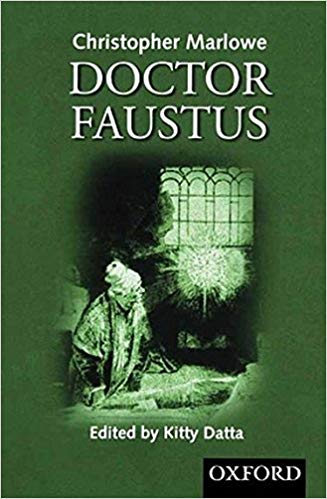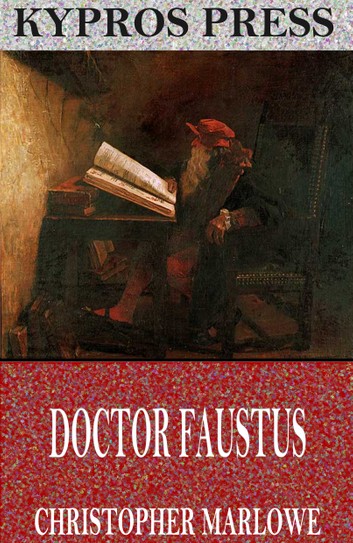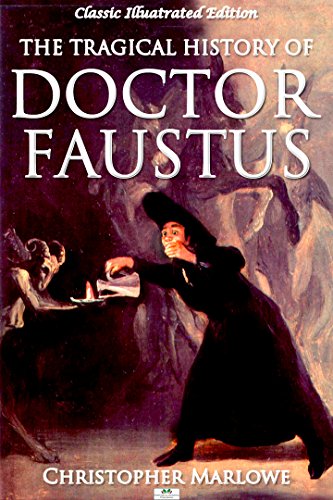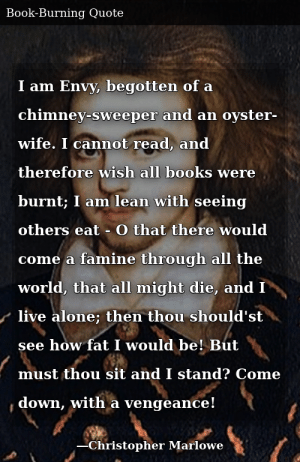Christopher Marlowe’s play Doctor Faustus as a renaissance tragedy embarks upon the rise of a new liberated cultural and social reform that moved England during the 16th century. The character of Doctor Faustus by Christopher Marlowe has an innate thirst for knowledge, power and the worldly pleasures. He is not satisfied with the traditional knowledge that the books have given him and yearns for more that will finally lead to his tragic end.
Christopher Marlowe’s Dr. Faustus has challenged the old conventions of medieval Europe and is a direct attack to the church’s doctrine of Catholicism. In a way, Christopher Marlowe’s Doctor Faustus is a ribald comedy and explains a man’s continuous hunger for knowledge, materialistic pleasures, lust and sensual desires that have been characterised through the interpretation of a greedy and impious man Faustus.
The play was published in 1604 and draws a satire to Christian beliefs and practices the virtues of reformation and Protestantism.

Christopher Marlowe Doctor Faustus Brief Summary
Contents
Doctor Faustus is a renowned scholar from Wittenberg, Germany who is bored with all the conventional knowledge of medicine, law, logic, and religion can provide him and wants more. He wants to practice necromancy or the art of magic. He summons his faithful servant Wagner and asks him to fetch two of his fellow scholars Valdes and Cornelius who are experts in magic.
Faustus starts practising the ritual alone in his laboratory when suddenly Mephistophilis, a devil and servant of Lucifer appears. Appalled by his ugly appearance, Faustus urges the devil to reappear as a friar. Faustus soon realizes that it is not in his hands and now that he has summoned the devil, he must face the consequences.
Faustus instead bargains with the devil and asks him to go back to hell in return for his soul and 24 years of infinite power. The devil agrees and Faustus signs a written agreement with his own blood. As soon as he signs the contract, he gets an inscription in his hands and realizes what he has done but Mephistophilis consoles him with gifts and magic spells.
As Faustus repents his decision in his private chamber, the Good and Evil angels appear. The Good angel urges Faustus to repent and seek forgiveness from God, but Mephistophilis and Lucifer appear together and convinces Faustus by bringing in the seven deadly sins and make them dance before Faustus.
In the next scene, Mephistophilis takes Faustus in a chariot ride to Heaven and landed in Rome into the house of Pope Adrian where the two become invisible and plays mischievous pranks with him.
Next stop is the court of German King Charles V where Faustus makes a magical visionary display of Alexander the Great. One of the knights in the court was sceptical of Faustus’s powers and Faustus makes a pair of horns appear in his head.
Next Faustus is seen selling a bewitched horse to a horse dealer and warns him not to walk the horse in the water. After a while the horseman accuses Faustus of foul play and that the horse has in fact turned into hay.
Faustus carries out numerous other tricks including bringing out fresh grapes in winter and so on. Time has gone and Faustus’s 24 years have passed and he is now about to die and enter the gates of hell. In the last act, Faustus asks for one last wish to emerge himself into the beauty of Helen of Troy.
An old man appears and asks Faustus to repent and beg for forgiveness to God and give up lust for worldly pleasures but Faustus refuses. The old man abandons him and as the clock struck eleven, the gates of hell open. Now, Faustus understands what he has done and how foolish he has been to sell his soul to hell.
As the clock struck twelve, devils appear amidst lightning and thunder and drag Faustus to hell and Faustus is damned eternally. Next morning, his friends find his body torn to pieces and gives him a proper burial.

Christopher Marlowe, Doctor Faustus pdf free download is available here: Doctor Faustus by Christopher Marlowe full text
Character Analysis of Doctor Faustus by Christopher Marlowe
Christopher Marlowe Faustus is a man of extreme intelligence. He is complex and ambitious and has a passion for knowledge of the unknown. He is ahead of his times and is highly accomplished and well-known among his peers. In spite of all the wisdom he had gathered for years, his ego fails him in the end and he is unable to understand the simple logic of life.
Marlowe’s character of Faustus is tragic and confused at the same time. The man is blinded by his superficial ambition and greed for power which will finally bring about his doom in the end.
Here Marlowe aims to portray a character who in spite of all the material pleasures, power and knowledge that he possesses, is empty inside. Ironically, knowledge which Faustus thinks is his power will be his greatest weakness. In the end, Faustus decides to burn all his book which demonstrates how he has wasted his life.
Marlowe’s Doctor Faustus is a typical representation of 16th-century renaissance character when the society has been able to come out of the age-old medieval constrictions. The play inspires its audiences to break the medieval beliefs of godly conventions and debate on the existence of supernatural powers and the difference between good and evil.

Doctor Faustus Christopher Marlowe Characters
Mephistopheles
Mephistopheles is a devil who is summoned by Faustus and is a servant of Lucifer, the lord of the underworld. His motives are ambiguous in the sense that even though he is a devil and lures Faustus to sell his soul, he warns him to make a deal with Lucifer and the horrors of the hell. His character is as tragic as Faustus and represents all the pain and sufferings of hell.
Chorus
Chorus is the narrator of the story and make comments standing outside the play. It is a customary tradition found in old Greek tragedy.
The Old Man
The old man is a mysterious character that appears in the last scene of the play and pleads Faustus to repent for his sins and ask for forgiveness from God. He is a representative of the Good angel.
Good Angel
The Good angel is merciful and is a messenger from God and represents all that is good and virtuous. He asks Faustus to leave Lucifer and find his faith and return to God’s mercy.
Evil Angel
The Evil angel just contrary to the Good angel represents all that is evil and unjust. It lures Faustus to continue his association with Lucifer.
Lucifer
Lucifer is the lord of the underworld and the king of Hell.
Wagner
He is Faustus’s servant. He learns some magic from his master’s spellbooks and uses them to summon devils and magic spells.
The Clown
The clown provides comic relief to the rather intense drama. He entertains the audiences with his ridiculous behaviour and is quite in contrast with Faustus’s complex character. In the end, Faustus loses his sanity and behaves much like the clown.
Robin
Another comic character, Robin is the innkeeper. He and his friend Rafe can do simple magic tricks and proves that one doesn’t need to be a scholar to possess magic skills. Marlowe here tries to prove how Faustus, in the end, will be reduced to the state of a simple trickster just like Robin and Rafe.
Rafe
Rafe is Robin’s friend and appears as a clown in the play.
Valdes and Cornelius
They are two friends of Faustus who teach him the art of black magic.
Horse Courser
He is a horse trader that buys a magical horse from Faustus that vanishes and becomes hay as he rides it into the water. The horse trader being duped by Faustus seeks revenge.
The Scholars
They are the colleagues of Doctor Faustus from the University of Wittenberg. They are his loyal friends and make an appearance both at the beginning and end of the play and are horrified with the outcome of Faustus.
The Pope
He is the head of the Roman Catholic Church. He is a stark contrast with the Protestant beliefs of England and offers a source of amusement to the audiences.
Emperor Charles V
He is one of the most powerful kings of Europe and Faustus visits and creates mischiefs in his court.
Benvolio the Knight
The knight is a German nobleman present at the court of Emperor Charles V. He ridicules Faustus’s magical powers and Faustus punishes him by growing two antlers in his head.
Martino and Frederick
They are friends of Benvolio who seeks to murder Faustus.

Christopher Marlowe Doctor Faustus Themes
Sin and Pride
Christopher Marlowe Doctor Faustus drama is a Christian play and Christianity is the very essence of the play. Faustus has made a pact with Lucifer, the King of the underworld which is a direct blow to Christian beliefs and is a sin. He not only abandons God but willfully goes against him and promises his loyalty to Lucifer.
Doctor Faustus’s pride is the reason for his downfall in the end. Pride according to Christianity is one of the seven deadly sins and blinds a man to realize his own fallen state. Doctor Faustus Christopher Marlowe scene 5 describes how the Good angel tries to convince Faustus to return to God’s mercy and enjoy the heavenly pleasures. Faustus invariably refuses and returns back to the devil. His pride makes him commit other sins and he does not feel any remorse.
Redemption and Damnation
According to the Christian beliefs, even the most terrible deeds can be forgiven through an act of redemption to the Lord Jesus Christ who died for the sins of mankind. There were many instances in the play when Faustus gets the opportunity to ask for forgiveness like the good angel or the old man, but Faustus has each time refused them.
Faustus throughout the play has shown his loyalty to Lucifer and hell and in numerous accounts has turned away from God. In a Christian framework, a person losing faith in God can be eternally damned to hell. This is what happens to Faustus and even in the final scene when he repents and asks for forgiveness to God, he is turned away and is eternally damned.
The Conflict between Medieval and Renaissance Beliefs
The conflict between the medieval and Renaissance beliefs forms the core theme of this play. In the medieval age, God was the centre of the universe and all living beings including man were required to be obedient and he who defies God shall be punished.
Marlowe’s Faustus is a Renaissance hero who is ambitious and has an incessant thirst for knowledge and power and breaks all the traditional rules of medieval Christian beliefs of God and religion. Faustus reflects a modern man who is free-spirited and ambitious but has to pay a massive price that will lead to his horrible death in the end.
The Influence of Power
In the first act of the play Faustus an eminent scholar full of new ideas and seeks the power that will help him to achieve the impossible. He dreams of great fortunes and also wants to learn and understand the puzzles of the universe and wishes to draw a new map of Europe. He wants to have Godly power and achieve everything that is beyond his knowledge.
The Good and the Evil
From the beginning of the play, Marlowe has set aside a few standards for the idea of good and the evil for us to judge. There is definitely a conflict between the good and evil angel. The good angel asks Faustus to repent and seek mercy whereas the evil one urges him to devote to Lucifer.
Heaven and Hell
The play has adopted the Christian belief of heaven and hell. Though it is merely a personification or a fragment of the imagination, it proves that good deeds are rewarded by heavenly bliss and sinful acts of immorality will be punished by eternal damnation of pain and suffering in hell.
Salvation and Mercy
Christians believe that one who seeks God’s mercy can seek eternal salvation and bliss of Jesus Christ. Even though Faustus who has signed away his soul to the devil, can repent and seek mercy from God and save his soul from the tortures of hell.
Superficial Pursuit of Knowledge
Faustus’s knowledge is superficial and empty and he does not understand the basic truth of life and ends up in hell. He has earned all the wealth and knowledge of the world but fails to utilize it for the good of mankind.
Blood
Christopher Marlowe Dr. Faustus acts of god blood clots which is a sign asking him to revoke the contract with the devil. Again, the blood resembles the soul of Faustus to Lucifer. In the end, Faustus cries out and says one drop of the holy blood will save him. Here he refers to the blood of Christ who gave up his body and soul for mankind.

Check out some of Marlowe’s famous monologues
Famous Plays by Christopher Marlowe
Famous poems by Christopher Marlowe
The Inevitable Day Poem by Christopher Marlowe
The Massacre at Paris, Christopher Marlowe Summary
Enter A Spy, The Double Life of Christopher Marlowe
Christopher Marlowe Famous Quotes
Christopher Marlowe Vs William Shakespeare Comparison